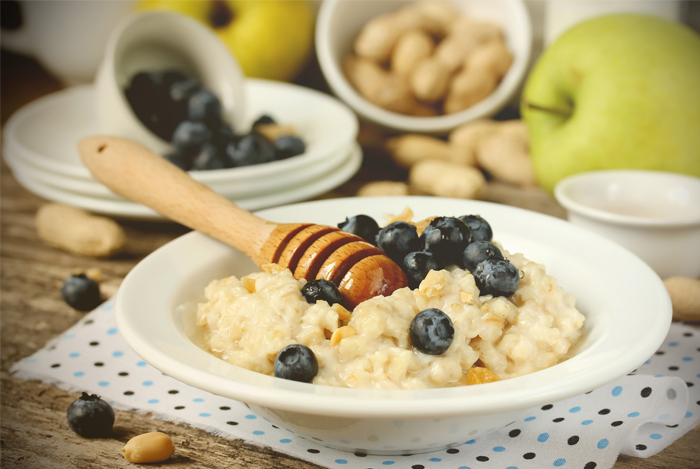Health is not a black and white issue and nothing is set in stone when it comes to ways to improve your health.
To complicate things even further, most individuals are also looking to change not just one, but several things about their health in order to improve their overall health and vitality.
But improving your health doesn’t have to be such a painful process and strict diets are not required in order to do so either.
In fact, extremely strict diets can impair your health, make you feel tired, and steal your happiness despite helping you drop weight in the short-term. This is not what improving your health is all about and there truly is a better way to optimal health.
So take a few minutes and consider these 10 steps that you can take to improve your health all in just 30 days. That’s right—just one month and these health and nutrition tips will have you feeling more alive, more energetic, your digestion will improve, and your belly will probably become a little flatter naturally!
And don’t worry; there are no chalky shakes to buy or protein bars to eat instead of a real meal, and there’s no need to workout for 2 hours a day just to lose weight.
Ready to dive in? Let’s go!
1. Clean it Out

First things first, you have to prepare your home for a healthier you, so the first step you should take to improve your health is to clean out your fridge, pantry, and your freezer in order to get rid of boxed items and other packaged goods with laundry lists of ingredients.
When it comes to what you should buy, stick to whole foods. This means fruits, veggies, greens, whole grains, legumes (beans, peas, lentils), raw nuts and seeds (not salted or coated in oil), and if you choose to eat animal protein, stick to healthier options such as wild fish and free-range, organic eggs.
If you’re looking to eat more plant-based, it’s also a good idea to pick up some non-dairy milk for ease of use and be sure to include plenty of whole grains and legumes in your diet. You can also choose to purchase gluten-free grains if needed.
Eating more whole, natural foods will help your body detox from the processed chemicals it’s holding inside which leave you sluggish, stagnant, and that can disrupt your healthy levels of gut bacteria. Whole foods nourish the body, feed good bacteria in your system, and they make terrific, nourishing meals too.
But you can’t have a healthy body without a home full of healthy foods, right? So give your kitchen a little clean out and fill it up with the good stuff!
For a starter grocery list and free meal plan, here’s a free one from Whole Foods that you can download and print out. You can modify this based on your personal preferences and where you shop, but it’s a great a basic list to start with.
2. Feel Great With 8

Getting 8 hours of sleep is so commonly recommended that most of us just let it go in one ear and out the other. But when it comes for one of the best ways to improve your health, getting adequate sleep each night is simply not optional. Your body must have at least 7-8 hours of sleep per night in order to operate at its best.
Some people actually need 8-9 hours in order to feel energetic the next day and function at their best which is no surprise when you consider how big of an effect sleep has on your overall health.
Sleep affects your hormones, digestion, and your weight so aside from your diet, getting enough rest each night should a top goal that you focus on when you’re looking to improve your health. It can make all the difference in the world in terms of how you feel no matter how much kale and how many chia seeds you’re eating!
So if you’re consistently tired all day long or have trouble sleeping, be sure you look into these helpful tips to help you sleep better so you can start getting to bed on time and waking up more refreshed.
3. Balance Your Macros

Macronutrients are carbs, fat, and protein. They are the number one sources of fuel our bodies use to do various tasks to help us operate at our best.
Micronutrients are vitamins and minerals which are also important, but micronutrients are found in all fruits, vegetables, greens, whole grains, nuts, and seeds which make them pretty easy to get enough of if you’re eating whole foods.
Macronutrients, on the other hand, tend to be an issue some people struggle with. Many people eat too much protein or don’t eat enough, others aren’t eating enough healthy carbohydrates while others eat way too much, and some people eat way too much fat or fear fat to the point that they don’t eat any sources of fat. An imbalance in your macros can lead to less than optimal health, so be sure you take a look at your diet to balance out your macros.
You don’t need to count your macros or go on a specific macro-friendly diet, but it’s still very helpful to be mindful of what you’re eating.
Most people thrive off of a diet with around 10-15% fat, 60-70% carbs (from vegetables, fruits, whole grains, and greens—not sugar and refined foods), and 30-40% protein. Essentially, each person is different, but too much of one macronutrient for your body can lead to weight gain and sluggishness just like eating too many processed foods and fast foods can.
So the answer is to start with whole foods and then take a closer look at what you’re eating each day.
Remember, protein, fat, and carbs are found in all foods so you’re probably eating more macros from each group than you think.
Take advantage of online resources such as Cronometer to see how much you’re eating and explore some ways you might be able to balance your macronutrients out to find your happy macro place!
4. Get Up and Move!

No one likes to think about exercising each day, but most everyone feels better after they get some activity.
So tackle your movement goals first thing in the day within the first hour you wake up. It won’t only help you feel more focused and energetic all day long but it also takes away the “I still have to workout” mentality that nags you the rest of the day when you postpone your activity time.
Set a goal to move for just 30 minutes each morning and do more if you wish. Great activities to enjoy include a brisk walk outside, light jog, jumping on a rebounder in your home, lifting weights, HIIT, or even just some light yoga each morning. Whatever you enjoy, do it!
Think you don’t have enough time? Along with getting that 8 hours of sleep you should be, you can adjust your sleep schedule to allow you an extra 45 minutes each morning to get dressed for your morning activity. You’ll be so glad you did, trust me.
Here are 10 foods that can also improve your workouts too!
5. Organize Your Life

If you think a harried schedule doesn’t affect your health, think again. Clutter in your brain creates internal stress and can affect your hormone health as a result.
There are multiple resources that you can take advantage of to organize your life in less time, even on the go. For instance, there are several free apps you can use to organize your schedule and help you feel less stressed. Some of my favorites are Trello, Clear, and Evernote.
Even just using your Google Calendar can save you a huge amount of hassle each day and take away the “Did I forget to do something else important today?” panicked feeling that comes at 5 p.m. or at the end of your day.
As you become more organized and your life feels more structured, you’ll feel much less stressed and happier. This one change can benefit everything from your weight to your sleep health in the short-term and the long-term. Try it and see!
6. Ditch the Natural Sugars

Alright, let’s touch on a touchy topic, so to speak. Added sugars.
Listen, added sugars are not helping you feel better and certainly not improving your health. So get rid of the coconut sugar, maple syrup, molasses, agave, honey, and fruit juice.
Added sugars still spike your blood sugar levels just like the white stuff, and although some natural sugars retain some nutrients after processing, your body still reads them as empty calories and they all negatively affect your insulin levels even if they do so less than refined white sugar does.
This rule of thumb doesn’t apply to fruit since it’s full of fiber and in its whole food package form. Fruit is much easier on your blood sugar levels and your body processes it completely different than it does added sugars.
For natural sweetness, use real fruit or a natural sweetener with no calories made from plants such as monk fruit or stevia.
Check the labels on these to make sure they only contain one ingredient (monk fruit or stevia). Both of these no-calorie sweeteners are made from real plants and not processed the same way in your body that added sugars and white sugar are.
Craving dessert? Have a piece of real dark chocolate and an apple or a cup of berries instead of something sugary sweet. It’s more satisfying and much better for your insulin levels too!
7. Hydrate!

Dehydration can make you feel hungrier than you are, negatively affect your adrenal glands which impairs thyroid function, and it can make you stressed and feel anxious. So be sure to stay hydrated throughout the day.
You can enjoy plain water, water with lemon or lime, or drink herbal tea to get enough water each day.
Staying hydrated also keeps your body flushing out wastes which can help you feel more energetic, encourage a flatter belly, and it ensures that your digestion is optimal too. And who doesn’t want that?!
8. Eat the Right Diet for Your Body

This is certainly easier said than done but it’s also crucial when it comes to ways you can improve your health. No one’s body is the same, so how can we expect to eat the same exact foods and meals as someone else and feel our best?
It’s true that a basic healthy diet works for everyone, and even specific diets like plant-based diets and Paleo diets can make a large group of people improve their health and start feeling better almost immediately.
But after that, specificity comes to an end and individuality must come into play for everyone to experience optimal health.
A great example?
You might feel amazing eating more carbs than protein and fat, while someone else might gain weight and have their energy levels plateau even though both of you are eating whole foods. Your neighbor might feel great eating meat and veggies while you prefer more eating more plants and less meat.
Just like people are allergic to foods, everyone has a specific diet that makes them feel their best. So explore what diet is best for your body and within the next month, take note of the changes you see based on the diet that you try to see which one makes you feel your best. Let your body be your guide!
9. Supplement Smart

There’s absolutely no need to resort to buying a bunch of supplements to improve your health. That being said, there are some nutrients you should still be mindful of to ensure you’re meeting your needs.
If you’re vegan or vegetarian, you absolutely must take a Vitamin B12 supplement. It’s non-negotiable and recommended by every health expert and medical doctor out there. Even meat eaters may be short in this nutrient depending on where they source their meat and how their bodies are storing the nutrients. So consider a B12 supplement at a minimum.
Vegans and plant-based eaters may also need to take a Vitamin D3 supplement since Vitamin D3 is not found in enough whole, plant foods.
Animal sources of Vitamin D include fish, some eggs, and some forms of dairy. Sunlight is the most natural source, but some people (even those who eat animal products) aren’t getting enough of this vitamin because their body can’t absorb it properly.
Other notable supplements you may want to consider are a whole foods-based multivitamin, probiotics to improve gut health, and digestive enzymes if you struggle with digesting certain types of foods.
If you’re eating whole foods, you can usually get what you need from your diet, but as you can see, some exceptions do apply.
The bottom line is that your diet is the best place to start with when it comes to improving your health, but some supplements can give you that edge you need for optimal health and in some cases, they may even be necessary.
10. Learn to Enjoy Health

Have you ever been so caught up in something that you looked back and realized you were miserable the whole time? More and more people do this with their health goals but it doesn’t have to be this way.
So as you look for ways to improve your health, be sure to enjoy the process. Get excited about trying new healthy, whole foods and explore new cookbooks with the types of eating styles you’re interested in.
Buy yourself a new workout outfit to inspire you to get up earlier, and download some new songs on your smartphone to complement your workout or even just your commute to the office.
The key takeaway is to enjoy the process of becoming healthier, even if you have a few slip-ups from time to time or make a few mistakes. In just 30 days you’ll not only have a better handle on your health but also be happier doing so too!
For more tips on how to improve your health and thrive this month, be sure to check out these nutrition tips that can even improve your appearance within the next 30 days too!
The post 10 Steps to Improve Your Health in Just One Month – No Strict Diets Required! appeared first on Nutrition Secrets.
http://www.nutritionsecrets.com/10-steps-to-improve-your-health-no-strict-diets-required/
No comments:
Post a Comment